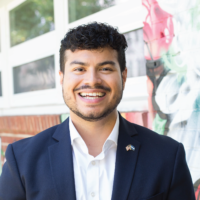January 28, 2021
For Today and Tomorrow: Increasing Health Coverage for Undocumented Virginians
COVID-19 has reminded us that our health and well-being are highly intertwined with that of our neighbors, and that our communities are stronger when everyone has the resources needed to be healthy and provide for their families. Virginia has made recent strides to offer affordable and comprehensive health coverage to more families living in the state – in 2019, Virginia’s uninsured rate dropped from 8.8% to 7.9% largely due to the decision to expand Medicaid. Yet 658,000 people remained without coverage, and just over a quarter (27%) of the total uninsured population in Virginia are foreign-born non-citizens. This is largely because many non-citizens, particularly undocumented immigrants, face several barriers to accessing health insurance. If Virginia would like to continue its recent progress in providing affordable health coverage options for those who call the state home and strengthen our communities, expanding coverage options for undocumented immigrants can be an important next step.
In 2020, Virginia legislators removed a barrier to accessing health coverage for lawful permanent residents, but additional work needs to be done to make sure more immigrant families in the state have access to comprehensive and affordable health coverage and services. Virginia’s immigrant population is ethnically and culturally diverse – 35% identify as Asian American or Pacific Islander, 33% identify as Latinx, 18% as non-Hispanic white, and 11% identify as Black – and varies in current immigration status, including naturalized citizens, lawful permanent residents, refugees, and undocumented individuals, among others.
Undocumented immigrants and DACA recipients (“dreamers”) in particular have limited health coverage options, and are banned from accessing health coverage through Medicaid, Medicare, or the Affordable Care Act (ACA) individual health insurance marketplace. The Migration Policy Institute estimates that 55% of all undocumented people living in Virginia do not have health coverage as of 2018.

Virginia lawmakers have the opportunity to build on recent coverage gains by advancing the following policy options to help undocumented immigrants access health coverage for COVID-19, prenatal care, and comprehensive coverage for children in low-income families:
Expand Eligibility for Medicaid/FAMIS MOMS Prenatal Health Coverage
Extending Medicaid/FAMIS MOMS prenatal coverage to women regardless of immigration status who meet all other non-immigration eligibility criteria would be an important coverage option for expecting mothers. This federal option is already in use in 17 other states and would require approval to amend Virginia’s CHIP state plan. Prenatal health coverage would allow more families to meet their health care needs during pregnancy and during the delivery of the child. This could also make securing ongoing coverage for the child easier as the family would’ve already been in contact with Virginia’s Department of Medical Assistance Services to access prenatal coverage.
Beyond the important health equity implications of this policy, it would also benefit Virginia’s bottom line. Extending prenatal coverage to undocumented people is projected to result in net savings for the state in the coming years ($2.3m for the budget year that begins July 1, 2021) since the federal government would pay a higher share of the costs compared to emergency only services that might be used otherwise. Budget amendments to expand access to prenatal coverage to women regardless of immigration status have been introduced by Del. Guzman and Sen. McClellan.
Clarify Emergency Medicaid to Cover COVID-19 Related Services
Virginia can strengthen its health response to the pandemic by clarifying that emergency Medicaid specifically covers COVID-19 testing, treatment, and vaccination. The emergency Medicaid program pays for certain services for people that would qualify for regular Medicaid but are ineligible due to immigration status. Services are traditionally limited to medical treatment required after the sudden onset of a medical emergency that places the individual’s health and bodily function in severe jeopardy, such as a heart attack or a broken bone.
Twelve states have publicly stated that they are offering COVID-19 services through this program and doing so may encourage more immigrant individuals to seek the services they need without fear of how they will pay for it. Legislation (House Bill 2124, Del. Lopez) to make this change has been introduced during Virginia’s 2021 legislative session.
This clarification would allow a singular statewide message to be shared widely and leave no doubt as to health care costs related to COVID-19 for all families with low incomes. Making sure that everyone has access to COVID-19 care, regardless of immigration status or income, will help reduce the spread of the virus throughout our communities.
Develop a Public Health Coverage Option Available to All Children
Six states (CA, IL, MA, NY, OR, and WA) and the District of Columbia currently use state-only funds to provide health coverage to children in low-income families regardless of immigration status. Half (50%) of all undocumented children in Virginia are estimated to be uninsured compared to only 4.9% of all Virginia children going without health coverage. Budget amendments introduced by Del. Krizek and Sen. McClellan directs Department of Medical Assistance to create a workgroup to research and recommend strategies for the financing of health care services for undocumented immigrant children. Virginia lawmakers should include this directive in their final budget so that more families can meet their children’s health care needs.
Together these policies can make an immediate and long-term difference in the lives of thousands of families across the commonwealth and help more Virginia families meet their health care needs. Virginia legislators should not hesitate to move forward with these policies due to the need to respond to the ongoing COVID-19 pandemic and the racial disparities in health care access highlighted by COVID-19 cases, hospitalizations, and deaths.
Categories:
Health Care, Immigration
